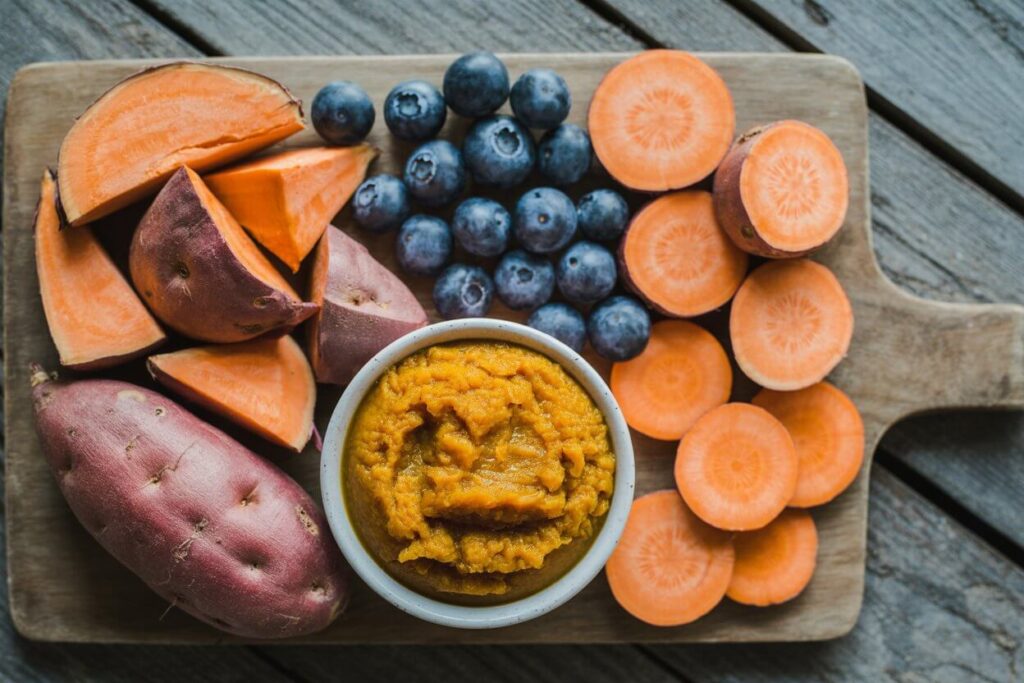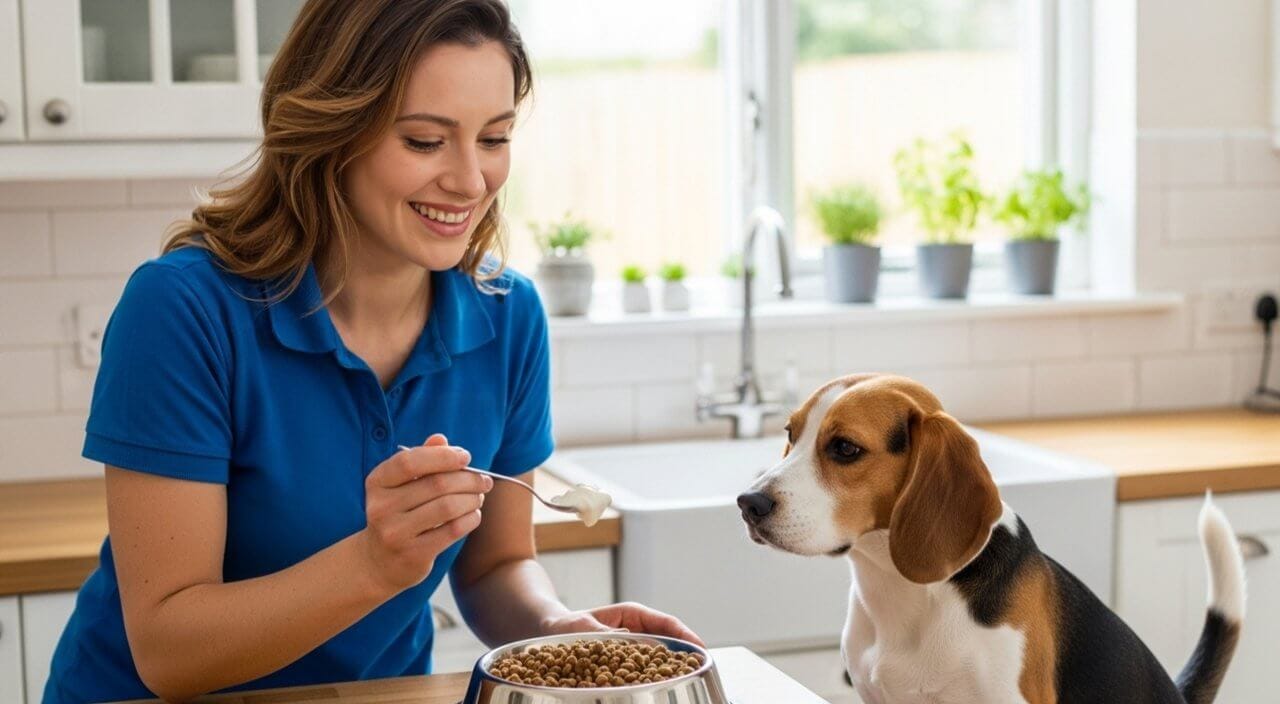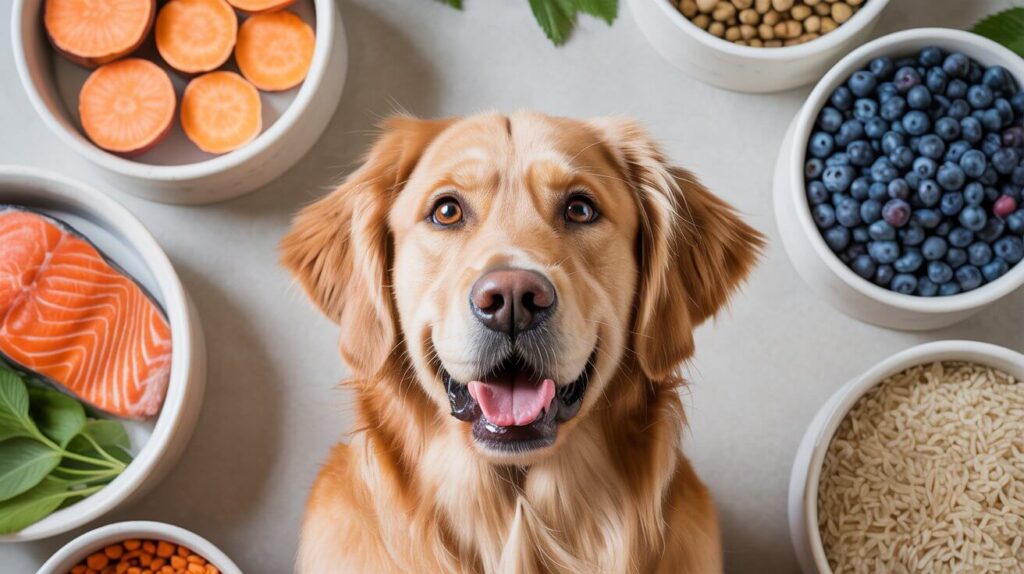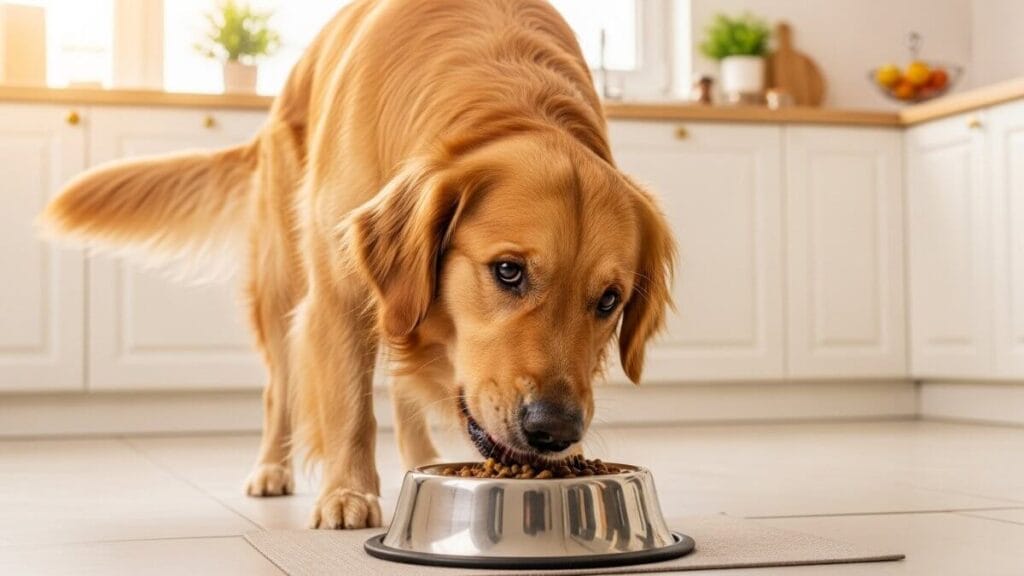I’ll never forget the frustration of watching my dog, Gus, constantly scratching his skin raw. For months, we chased what we thought were skin allergies, but his energy was still low and his coat was dull. The real breakthrough came when our vet suggested we look deeper at his gut. This experience led me to extensively research both skin allergies and digestive health, and I discovered how deeply connected these systems really are.
As a certified trainer, I’ve since seen this connection countless times. A dog’s gut health is the foundation of their overall well-being. This guide will show you how to improve dog gut health with simple, natural, and actionable steps to restore that balance and help your dog thrive from the inside out.
Smarter Paws Academy is reader-supported. When you buy through links on our site, we may earn an affiliate commission at no extra cost to you. As an Amazon Associate, I earn from qualifying purchases. Thank you for your support!
Important Health Disclaimer
The information in this article is for educational purposes only and is based on my experience as a certified dog trainer. It is not a substitute for professional veterinary advice. Please consult your veterinarian to diagnose any health issues and before adding any new supplements to your dog’s diet.
Quick Tips for Improving Your Dog’s Gut Health
- Look Beyond the Bowl: Signs of poor gut health aren’t just digestive upset. Chronic itchy skin, low energy, and even anxiety can be linked to an imbalanced gut microbiome.
- Add Probiotics & Prebiotics: A high-quality probiotic supplement adds beneficial bacteria, while prebiotic fiber from sources like pumpkin powder feeds them.
- Focus on Whole Foods: Incorporating gut-friendly whole foods like sweet potatoes, blueberries, and carrots can provide natural vitamins and fiber to support digestive health.
Prefer to Listen? An Audio Overview
For a conversational deep dive into this topic, press play below for the complete audio discussion.
Runtime: 1 minute 40 seconds
View Full Audio Transcript
Narrator: Welcome to the Smarter Paws Academy audio overview. Today, Sandie is diving deep into a topic that’s foundational to a dog’s overall well-being: gut health. Sandie, what are the signs of poor gut health that owners might be missing?
Sandie Calloway: Thanks for having me. The most important thing to know is that it’s not just about diarrhea or gas. The gut is the command center for the whole body. So, chronic itchy skin, hot spots, low energy, and even new or worsening anxiety can all be signs that your dog’s gut microbiome is out of balance.
Narrator: That’s a huge connection for owners to make. So, what’s the first natural step someone can take to improve their dog’s gut health?
Sandie Calloway: The simplest and most powerful step is adding probiotics and prebiotics. Probiotics are the “good” bacteria that help restore balance, and you can get them from a high-quality supplement. Prebiotics are the food for those good bacteria. An easy source of prebiotic fiber is a simple scoop of 100% pure pumpkin powder in their food.
Narrator: So you’re adding good bacteria and then feeding them what they need to thrive. What about whole foods?
Sandie Calloway: Absolutely. Adding small amounts of gut-friendly foods like steamed sweet potatoes, blueberries, or carrots can provide natural fiber and antioxidants. And for a dog with a really irritated system, a gut-soothing food topper like bone broth can be incredibly helpful for hydration and healing the gut lining.
Narrator: That’s fantastic, actionable advice. It sounds like small, consistent changes can make a big difference.
Sandie Calloway: That’s exactly right. It’s about supporting their system from the inside out. A happy gut truly leads to a healthier, happier dog.
Table of Contents
What Are the Signs of Poor Gut Health in Dogs?
The first step to improving your dog’s gut health is learning to recognize the signs of an imbalance. It goes far beyond just an upset stomach. A dog’s gut microbiome—the community of trillions of bacteria in their digestive tract—plays a huge role in their overall health. As scientific reviews in journals like Applied Animal Behaviour Science have shown, this system influences everything from immunity to behavior.
Here are the common signs of poor gut health I tell my clients to watch for:
- Obvious Digestive Issues: This is the classic sign. Chronic gas, bloating, loose stools, or diarrhea are clear indicators of an imbalance.
- Skin Problems: This is the big one many owners miss. Constant itching, hot spots, yeasty-smelling skin, and a dull, flaky coat are frequently linked to poor gut health. If your dog is primarily experiencing skin issues, our comprehensive guide to the best dry dog food for skin allergies explores how dietary changes can specifically target these symptoms.
- Low Energy: If your dog seems lethargic or less interested in play than usual, it could be because their body isn’t absorbing nutrients properly.
- Behavioral Changes: New or increased anxiety or reactivity, like suddenly barking at people, can be connected to the gut-brain axis.
4 Natural Ways to Restore Your Dog’s Gut Health
Restoring your dog’s gut health is about creating a healthy environment where good bacteria can thrive. Here are four simple, natural strategies you can start today.
1. Start with Gut-Friendly Foods

What you put in your dog’s bowl is the single most powerful tool you have. Adding gut-friendly whole foods can provide natural fiber, antioxidants, and vitamins. Simple additions like plain, canned pumpkin or steamed sweet potatoes are fantastic sources of fiber. Blueberries are packed with antioxidants, and carrots are great for dental health and vitamins.
(For a complete guide on what to feed, see our top picks for the best dog food for a sensitive stomach. Many dogs with gut issues also experience skin problems, so you may want to check our guide to managing skin allergies through nutrition as well.)
2. Add a High-Quality Probiotic
Probiotics are live, beneficial bacteria that help restore balance to the gut microbiome. Think of them as reinforcements for your dog’s internal army. As explained by the Cornell University College of Veterinary Medicine, supplementing with probiotics can be particularly helpful for dogs with diarrhea, intestinal inflammation, or those who have recently been on antibiotics.
Why it’s my top pick: This is a powerhouse all-in-one supplement. It contains a clinically studied probiotic strain for digestive balance, plus digestive enzymes to help your dog absorb more nutrients from their food. It’s a fantastic first step for any dog needing gut support.
3. Incorporate Prebiotic Fiber
If probiotics are the “good bacteria,” then prebiotics are their food. Prebiotics are a type of fiber that nourishes the beneficial bacteria already living in your dog’s gut, helping them multiply and thrive. Pumpkin powder is one of the best natural sources of prebiotic fiber.
Why it’s a pantry staple: This organic pumpkin powder is a pure and simple source of prebiotic fiber, which is the essential food for your dog’s good gut bacteria. It’s incredibly effective for firming up loose stools or easing constipation, making it a must-have for any sensitive dog.
4. Soothe the Gut with Bone Broth
Bone broth is a hydrating, nutrient-dense, and incredibly gentle food topper. It’s rich in collagen and gelatin, which can help soothe and support the lining of the digestive tract. It’s a wonderful addition for picky eaters or dogs recovering from an upset stomach.
Why it’s so effective: This human-grade bone broth is like a warm, healing soup for your dog’s gut. It’s rich in natural collagen and gelatin that help soothe the gut lining, while also providing crucial hydration. It’s perfect for picky eaters or dogs recovering from an upset stomach.
How Do I Reset My Dog’s Digestive System?
If your dog is experiencing a bout of acute digestive upset, a short-term “reset” with a bland diet can be very effective. This involves feeding a simple, easily digestible meal for 24-48 hours to give their gut a chance to rest and recover. My go-to bland diet is a simple mix of boiled, lean ground turkey (with the fat drained) and plain, canned pumpkin. Remember, this is a temporary fix, not a long-term diet.
What About Digestive Enzymes?
Digestive enzymes are proteins that help your dog’s body break down fats, proteins, and carbohydrates, allowing them to absorb more nutrients from their food. While a healthy dog produces enough of their own, some dogs—especially seniors or those with certain health conditions—can benefit from a supplement. They can be particularly helpful in reducing gas and bloating.
Why it helps: For some dogs, especially seniors, the issue isn’t just balance—it’s breaking down food effectively. This powder combines a blend of digestive enzymes with probiotics, helping your dog’s body unlock and absorb more nutrients from every meal.
Frequently Asked Questions
How do I know if my dog needs a probiotic?
Common signs that your dog might benefit from a probiotic include chronic gas or diarrhea, frequent yeast infections, or if they have just finished a course of antibiotics, which can disrupt the gut flora. They are also helpful during times of stress, like travel or boarding.
Are eggs, Greek yogurt, or cottage cheese good natural probiotics for dogs?
In moderation, these can be beneficial. Plain Greek yogurt and cottage cheese contain live probiotic cultures. Scrambled eggs are an excellent source of digestible protein. However, some dogs are lactose intolerant, so always introduce dairy in very small amounts. For a therapeutic dose of probiotics, a dedicated supplement is far more potent and reliable.
How can I tell if my dog has a leaky gut?
“Leaky gut” is a condition where the intestinal lining becomes permeable, allowing undigested food particles and bacteria to “leak” into the bloodstream, causing an inflammatory response. Symptoms often include severe food allergies, chronic skin issues, and widespread inflammation. This is a complex medical condition that requires a diagnosis and treatment plan from your veterinarian.
Is coconut oil or salmon oil good for gut health?
While both have benefits, salmon oil is generally superior for gut health. This is because salmon oil is rich in Omega-3 fatty acids, which are powerfully anti-inflammatory. As research from sources like PubMed Central has shown, reducing inflammation is a key part of managing the gut-brain axis and supporting overall digestive wellness.
How long does it take to see improvement in my dog’s gut health?
Be patient. For minor issues, you might see an improvement in digestion within a few days of starting a new supplement or diet. For more chronic problems like skin issues, it can take 4-8 weeks to see significant, lasting changes as the body heals and the gut microbiome rebalances.
A Thriving Dog Starts from the Inside Out
Improving your dog’s gut health is one of the most powerful things you can do for their overall well-being. It’s not about chasing a quick fix, but about building a strong, resilient foundation through mindful nutrition and natural support. By focusing on whole foods, beneficial supplements, and a partnership with your vet, you’re not just solving digestive issues you’re investing in a longer, happier, and healthier life for your best friend.







